I am having fun in Wisconsin. Or am I? You make the call.
Month / September 2006
Enemy Combatants
Because I am a loyal American, I took the following pictures of individuals who I believe are “enemy combatants.” While I have no proof as to their terrorist potential, I did observe these shady characters squawking by a lake, and I believe that they intend to fly south and take down America during migration season. One can never be too sure of terrorists in this climate, even though it is relatively calm here in Wisconsin and the people are nice. (Why are they so nice here in Madison? Could it be that they are hiding something?)
I have reported these suspects to the Pentagon, who I understand will arrest these suspects without habeas corpus for the safety of America. I also understand, now that the United States disregards the Geneva Conventions, that these suspects will be tortured. I look forward to enjoying them at a forthcoming dinner I have scheduled next week with Donald Rumsfeld.






How to Meet Laura Lippman
One would think that flying out 2,000 miles would have been good for at least a little more than hello. However, having a Y chormosome and somehow being in attendance at Laura Lippman‘s bachelorette party (along with other men), I’m sure there were extenuating circumstances. Upon entering the party, several ellipitical layers of people were seated and standing around a circle of couches. I was, I suppose, an unexpected mosquito planting himself on the outer epidermis, with Ms. Lippman herself protected by a group of loyal queen bees quaffing swank beverages.
Undaunted, I wrote a note to Ms. Lippman, expressing my congratulations, with at least one adept witticism and the hope that I might engage in a brief chit-chat of no more than two minutes. The note was conveyed from one hand to another to another, and eventually Ms. Lippman read the note and cocked her head left and right for this mysterious “Ed Champion.” I offered a broad smile and an inaccurate though heartfelt form of semaphore. But this, however, was not enough. Ms. Lippman soon became deeply embroiled in a conversation that caused her to raise her forehad in excitement. And very soon, I was contriving a strategy with a few mystery authors on how to deliver ourselves into the inner circle.
I gave up rather quickly on this exercise. I was not, after all, at a cotillion dance. And the mystery writers abandoned me without notice. And not long after, the snappy dirty martini I had imbibed had reached the micturition phase. I fled to the restroom and, while waiting in line, the one and only Laura Lippman and friend had reached a similar stage. And I was able to throw myself forward and make Ms. Lippman’s acquaintance, while considering the vagaries of her bladder. Upon our respective descents from the bathroom, there then began a rather fey descant and pretty soon I was being steered into the inner circle, where I was being urged to meet everybody, heaven knows why.
I am not a person to boast, but I could not let this fast-track delivery into the inner circle go unobserved by the mystery authors who had abandoned me without notice. But I decided instead to take the high road that evening, thinking of the disreputable long-term path I could follow in the morning by mentioning all this on my blog.
But let this tale serve as a parable. The public restroom cannot be underestimated. Indeed, one might declare it the great social equalizer.
Bouchercon Panel: Reviewer Ethics: The Reviewer’s Responsibility
Deeper questions about Bouchercon’s troubling insular nature will have to wait. I’ll just say for now that, more than BEA, APE, WorldCon and nearly every other writers or readers conference I have ever attended, you will be a conversational pariah if you haven’t read the latest sixty hot mystery titles. I’m sure these folks are perfectly nice, but, given how fixed and unwavering they are on this subject (it is as if that creep who assaulted those kids in Colorado never happened), I’d rather head down State Street and have a beer and a brat with the Madison locals. More on this subject later.
For the moment, here’s a report on this afternoon’s panel Reviewer Ethics: The Reviewer’s Responsibility.
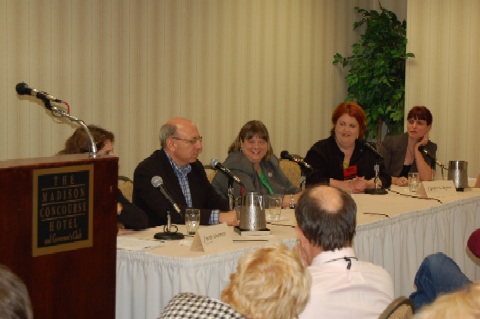
From L to R: Sarah Weinman (Moderator), Larry Gandle, Oline Cogdill, Sarah E.C. Byrne, Jennifer Jordan
I entered the room as the group was discussing the similarities and differences of professional and amateur reviews. Jordan opined that online reviews offered a looser and freer feel, with offbeat and quirky books getting offbeat and quirky reviews. She didn’t follow a set formula, but considered pro reviews to be more of a challenge. Gandle, by contrast, took the same approach for both pro and an amateur reviews, suggesting that a mystery review shouldn’t be as cryptic as certain reviewers for the New York Times Book Review. “I have absolutely no idea what she’s saying,” said Gandle.
Cogdilll noted that she felt giving away the plot was a violation of the reader’s trust. This led Byrne to chime in about police procedure discretions also being a violation of this trust. But who has the time, amateur or pro, to confirm these auctorial solecisms?
Cogdill, who reviews mysteries for the South Florida Sun-Sentinel, inferred that the pro and the amateur set faced the same dilemma, pointing out that what she writes about often goes directly into the paper, with a quick look-see through a copy editor if there’s time.
Sarah brought up the question of conflicts of interest. Cogdill was particularly adamant about this, pointing out that she always paid her own way whenever she was wined and dined by a publisher. There was a difference between being a friend and being friendly, although this depended with each particular person. Gandle took a more egalitarian approach to the issue, noting that he buyed authors drinks and sometimes authors bought him drinks. He believed that none of this got in the way of his reviewing. Jordan likewise felt that she could aver the difference between the author and the work. Gandle, however, tended to avoid personal contacts with authors. “I don’t want to be punched out,” he said, leading Jordan to offer her services to protect him, if any physical confrontation went down at Bouchercon.
Cogdill, as ethical as she was, noted that if an author had a problem with one of her reviews, “it’s the author’s problem, not mine.” Some authors take issue with the work, some don’t. But the author’s temperament had, in her view, little to do with the reviews. “I’ve panned nice people,” she said. “I’ve raved about raging assholes.” While she didn’t review her friends, she still noted that she would review her husband’s book.
Offering a perspective from Australia, Byrne noted that reviewing in Australia involved negotiating a tiny literary community, one very hard to break into. But she seemed content to pull her punches, noting that if the book was bad, she wouldn’t review it.
Sarah asked for a ball-park estimation on the number of books each panelist read in a year. Cogdill offered a precise 208 (four books, fifty-two times a year). Jordan: Over 200. Gandle: Only two a week, with a full-time job. He apologized for being a slow reader.
Did publicists have any sway over what books were covered? To a certain degree. Sarah noted that it was part of her job to be aware of publishing trends and that she had to peruse “the reads of the year.” Cogdill did feel it a duty to cover “the big read of the year,” but all panelists expressed variations on these “big reads” often being disappointed. Case in point: the many Templar books that had crowded the mystery market.
An audience member asked if a first-time writer writing for a small-time press could “cut through the clutter.” But the answers to this question were fairly rote. Jordan’s answer, for example: a soft touch, quiet reminding.
Cogdill noted that gimmicks were more problematic than they were worth. One author had sent a package ten years ago having to do with the World Wide Web. She opened the package and was greeted by plastic spiders exploding out of the package, causing Cogdill to scream and the novel to be discarded. She cited another incident involving an author who had sent a book in a small coffin. The book was contained in a satin bed and it had cost the author $20 to send this through the mail. In the end, the creep factor had caused her to disregard the book.
Professionalism was a virtue. Cogdill described another novelist who had applied various Post-Its along the manuscript. (“I’m going to beef this section up,” read one.) Further, getting books in the hands of reviewers six months before their pub date was considered a great way to improve the possibility of this book being considered. Jordan noted that she could better plan her reading schedule if the book was in her hands well in advance.
A gentleman from the back asked what the point of writing negative reviews were. Gandle cited a well-known Amazon reviewer, who he had apparently attempted to persuade against writing nothing but positive reviews. Balance was important not only for critical acumen, but, as Jordan noted, to present readers with an idea of what the reviewer’s tastes were. The panelists, for the most part, disregarded Kirkus, PW and any of the other major review sources, opting instead for the cold review approach.
Bouchercon/Madison Photos
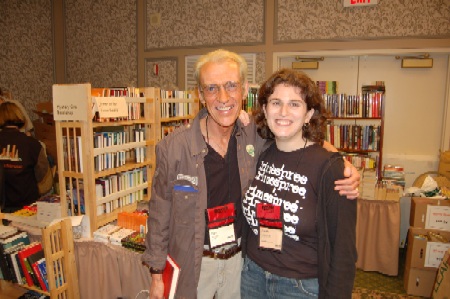
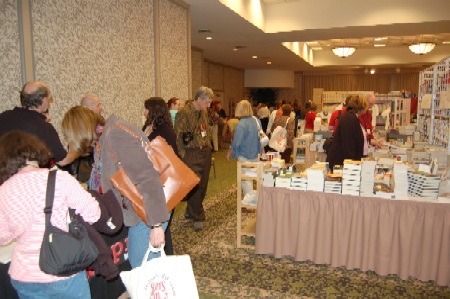
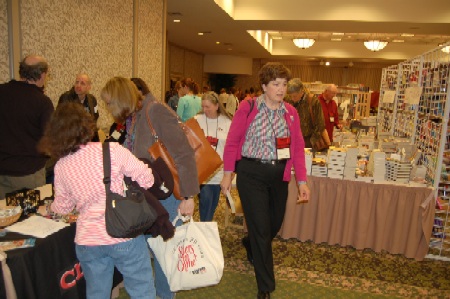
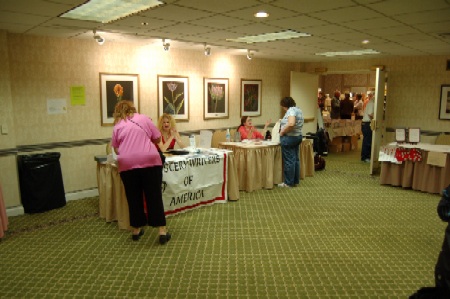


Well, This IS Close to Milwaukee
Sarah Weinman stars in a Miller Lite commercial.
Madison
I am in Madison, Wisconsin. I will have more to say later, which will likely ruffle a few feathers. Nevertheless, the truth must be reported.
It is safe to say that there is more here than cheese. Madison is a pleasant place.
The people, however, tend to drive within the speed limit rather than with the flow of traffic. Or, rather, they are more committed to being good citizens instead of being good drivers. This is problematic if you happen to be a California driver and you are used to the Andretti-like manuevering of Angelenos.
Madison’s downtown makeup, a thin rectangular isthumus nestled between two pleasant lakes, reminds me very much of Berkeley’s, except that there is a giant capitol in the middle, it’s 40 degrees out, and, in certain areas, there is a greater whiff of provincial self-absorption in the air than Cole Valley or Union Street. But, for the most part, it’s a pleasant town gleefully at odds with the state of Wisconsin. If one can judge a city by its park benches, as I often do, there are quite a number of them here, often perpendicular to gushing white bus stops and other monuments suggesting an unwavering commitment to environmentalism. This suggests a city of little crime, as benches are often the first thing to go when fighting riff-raff.
I listened to an interesting conversation among two desk clerks mystified by the concept of the beef shawarama. And I have done my best to corrupt some of the Madison locals with recherche banter.
Concering BoucherCon, as a literary outsider looking in, I will have quite a few things to say about it. But the below photo communicates the general atmosphere:
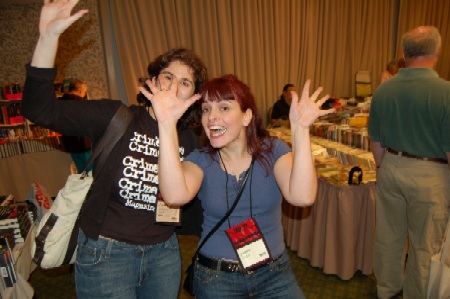
More to come.
Bouchercon
Future dispatches will arrive here from Wisconsin. I remain confident that there is more than cheese there and will report my findings.
A Tale of Two Critics
There was a needless post here that has since been removed.
The Problem with MUNI
For those looking for fresh content, I have a guest editorial at the SFist today. I assure all readers that I have considerably fewer follicles than the photo Eve dug up.
Ed Jones
Robert Birnbaum talks (a second time) with Edward P. Jones.
Wayne Shannon: A Case Study for the Internet’s Failings?
While working on something tonight, some synaptic associative charge kicked in and I recalled a commentator named Wayne Shannon. The name probably means nothing to you if you didn’t grow up in the Bay Area twenty some odd years ago, but Shannon was a smug, wry, and roly-poly guy in his late forties with a graying moptop who appeared frequently on KRON Evening News in the 1980s, offering commentaries at the tail end of the program laced with acid barbs that questioned everything and everybody. Shannon was one of those bear-like guys that local television stations tended to employ. A guy who employed common sense arguments to mock the many things in life. Including, as I recall, Jim and Tammy Bakker.
I don’t know if Shannon was all that witty of a commentator, but his exuberance had, for whatever reason, made an impression upon my brain. And I tried Googling him to see if he was still around, only to find almost no traces of his existence. Not a single person had cobbled together old videotapes. Not a single person remembered him. It was as if he had never existed.
I had hoped that Google would permit me to corroborate my memories. Here was a guy who, even if he was a minor television personality, likely entertained millions of people not more than twenty years ago and not a single one of these people thought to memorialize him. For all I know, I might be the first person to remark upon his existence.
And it occurred to me that the Internet is not all that great of a resource after all. Perhaps there really is a need for us to chronicle our cultural minutiae. After all, if the newspapers are giong to hide behind paywalls, allowing articles to disappear within weeks, then it might just be up to us to recall what they had to say. But is our commentary really a reliable record? Is our subjective viewpoint really presenting the situation well? Should we not be writing up more objective reports?
Another thing that’s troubling me: Why should I be using Google to confirm my memories? Why should I believe it to be the ultimate oracle when I could call KRON up and see if I could obtain some videotapes or ask what became of Shannon? When I can go back and search through old microfilms?
(Aside: Wayne Shannon did exist. I did not hallucinate him. He left KRON in 1988 when news director Herb Dudnick became tired of his essays and he tried to negotiate a new deal unsuccessfully. Perhaps he pissed too many people off. He resurfaced on CNBC, but how long he lasted, who can say?)
And here again, I find myself needing to confirm my memory against something. Even a few fleeting facts that still don’t tell the whole story.
A few years ago, I had a short-lived blog called Raising Caen, in which I read Herb Caen’s old columns, starting from 1938, and tried to see if there was any trace of any of the people or places he referenced online. No surprise. Most of them had disappeared. Major stores such as the Martha Washington Candy Shop chain, remembered fondly for its vanilla butter cream coated with dark chocolate, were unmemorialized. (More references can be found here.)
The point of all this is that, if you run a blog, you have a duty to remain curious about all sorts of things. You have a duty to present some element or representation of the truth that others might be able to jump off from or that, at least, permits them to read between the lines. A subject like Wayne Shannon may have seemed banal twenty years ago, but today, as I ponder if the man’s alive or dead and contemplate whether my own favorable response to him might have influenced me in some way, I would have been grateful for some online mention. Now it appears I’ll have to do some considerable footwork.
Is this journalism? Not exactly. But bloggers are, in their own strange way, keeping historical records. While I might go to the library to look up Wayne Shannon, I’m guessing that the general public would remain lazy about this. Perhaps, more than we realize, it’s up to us to do a better job.
[2008 UPDATE: You can now listen to a podcast interview with Wayne Shannon.]
[2012 UPDATE: Wayne Shannon has passed away. Here are my memories of befriending him, and here is a 21 clip video salute.]
Thank You, Keith Olbermann
Given That the Bidding Crowd is Composed of Existentialists, One Wonders Whether A Final Bid Truly IS A Final Bid!
USA Today: “A rare copy of Danish philosopher Soeren Kierkegaard’s famed book, Either/Or, will be sold at auction later this year, a Copenhagen auction house said Tuesday.”
If By “Everyone,” You Mean Someone With Endless Spare Time and Millions in the Bank Account, Sure.
New York Times: “When filming of ‘Tennessee’ was pushed back indefinitely, she began a regimen of exercise and healthy diet to loose the weight. ‘People think it’s impossible to lose this much weight, but it’s not,’ she said. ‘Everyone can do it; you just have to be really disciplined and want it.’ She’s now working on a weight loss book and DVD.”
Tricia Sullivan: Try Out the Samples
Tricia Sullivan, the author of the fascinating and underrated novel Maul (which I read a year and a half ago in its UK edition and which Night Shade Books, bless its heart, picked up for American release), has a LiveJournal.
The Literary Hipster’s Handbook, 2006 Q4 Edition
“bad beef”: A literary prize ostensibly designed to assist struggling writers that goes instead to writers who don’t need the cash or the praise. Recent examples of bad beef include Haruki Murakami winning the O’Connor Short Story Award and John Updike winning the Rea Award. The phrase “bad beef” has begun to shift to writers who have secured a considerable windfall and who feel the need to remind more impoverished writers of their affluence. (Ex. He got him the Park Slope digs, the nubile wife, and he can write any novel he wants. And he don’t talk of nothing else. He keep up this bad beef and I’ll kick his bitchy little vegetarian ass.)
“Discomfort Zone”: An area in a bar or cafe populated by whiny middle-aged dilletantes to be avoided at all costs. Discomfort Zones are sometimes cordoned off with a red velvet rope, suggesting to the dilletante that he is a VIP. However, the real intent of the rope is to protect a happening establishment from “novelists” too stiff, gushing, and self-absorbed to join the more friendly and fun-loving clientele. (Or.: Jonathan Franzen.)
“Doubting Thomas”: A literary hipster who wishes to cast doubt on a forthcoming autumn title, particularly those with a sizable page count and those written by a white male in good standing. The term was inspired shortly after news broke on Thomas Pynchon’s forthcoming novel, Against the Day, and several literary hipsters began to cast serious doubts amidst the hype, demanding that the hype be shifted to experimental novels that only a handful of people will actually read. Other titles that Doubting Thomases have publicly questioned: Norman Mailer’s The Castle in the Forest, Richard Powers’ The Echo Maker, and Richard Ford’s The Lay of the Land.
“This is/This is not…”: A rather curious conversational form has emerged among literary hipsters that is somewhere between a shit-flinging contest and a Socratic debate. Inspired by the two chicklit anthologies edited by Elizabeth Merrick and Lauren Baratz-Logsted, literary hipsters have begun to contradict each other, particularly in discussions involving misunderstood genres. The following conversation, for example, was overheard at a Greenwich Village pub:
HIPSTER 1: This is a novel.
HIPSTER 2: This is not a novel. It is a piece of shit.
HIPSTER 1: David Markson? This is wrong, cat. And I’ll kick your ass if you sully my man Markson’s name any further.
HIPSTER 2: This is not wrong. You haven’t read Hemingway, have you?
HIPSTER 1: This is a lie. (pause, hits HIPSTER 2 over the head with a beer bottle) How does that feel?
HIPSTER 2: This is not a lie. I am bleeding. Please take me to a hospital.
HIPSTER 1: This is your problem.
HIPSTER 2: This is not my problem. You hit me with the beer bottle. I expect you to pay my doctor’s bill.
HIPSTER 1: This is unreasonable. You’re the one contradicting me.
HIPSTER 2: This is not unreasonable. Will somebody call 911?
And so on.
As can be observed, this recent conversational trend can often end in horrible violence, leaving literary hipsters to pursue this vernacular as a last resort. Unfortunately, recent friction between the print media and the online media has resulted in more unnecessary head bashing and at least one stabbing, when two literary hipsters attempted to recreate the Lev Grossman/Edward Champion contretemps. (Fortunately, the stabbing hipster followed up by sending a fruit basket.)
It is advised by this lexicographer to avoid any conversations that play out along these lines.
“to Max out”: To use one’s questionable blogging abilities to secure a lucrative book deal, only to write a book so bad that not even a vaguely erudite leper will touch it. This euphemism came from the short-lived turn of phrase “to Cox out.” But since literary hipsters have no desire to remember or reference Ana Marie Cox’s dreadful novel, Dog Days in any way, and since, more importantly, Tucker Max is a douchebag, the term was changed to fit the ever-changing literary climate.
“to Wallace”: To write a generalization-laden essay over and over again, often employing a once fresh but now tired stylistic device such as footnotes. (Or.: “Federer as Religious Experience”)
A Special Message from Albert Yonklas, Respected Author
Damn readers! Damn them all to hell! They want me to sign their books and throw my wrist out of alignment. They expect me to add an extra horizontal whoosh when I cross my T. They want to compare the signature that I offer in one book to that of another. Well, don’t they know that I apply my creative acumen to my work? It’s there in my National Book Award-winning novel, Butterflies in Toledo. The groupies may have been smelly, but they were just competent in bed. Even so, don’t they realize that I’m not entitled to give these atavistic rodents anything? That they have B.O. and bad breath?
 Well, the time has come for conformity, dammit! And this is why I must thank Margaret Atwood for taking a stand. Forget Iraq. Forget poverty. Forget AIDS. No! The single most important issue facing the world today is placating authors. And I, Albert Yonklas, will not rest until I am thoroughly pampered and fellated to the high heavens. That goes for readers. That goes for publishers. And that goes even for other published authors. They can all suck my capacious penis, if you catch my drift.
Well, the time has come for conformity, dammit! And this is why I must thank Margaret Atwood for taking a stand. Forget Iraq. Forget poverty. Forget AIDS. No! The single most important issue facing the world today is placating authors. And I, Albert Yonklas, will not rest until I am thoroughly pampered and fellated to the high heavens. That goes for readers. That goes for publishers. And that goes even for other published authors. They can all suck my capacious penis, if you catch my drift.
Very few authors are willing to confess the truth: that readers are soulless cretins who should just buy our damn books and shut the hell up. But the time has come to teach these troglodytes a lesson. You want me to sign your book? Without a complimentary blowjob? Take a number, amigo.
You actually want me to sign your book with a pen? And add a personal message? Or perhaps a funny little diagram? Who the hell do you think you are? I’m not a cartoonist. I’m a novelist! You’re not! And you are entitled to a signature as soulless and indistinct as your foolish questions. Where do I get my ideas? I’ll tell you where. By glimpsing up your stinking piehole!
I’ll never tour again thanks to the LongPen. You want a piece of me? Catch it on video. Video is more intimate, you slimebags! The fans prefer it! We have no basis for this, but everyone know it’s true. And before all you leftist scum start bitching about the environment, the LongPen is environmentally sound! I’m not getting the Al Gore crowd on my ass.
I have to hand it to Peggy Atwood. What a great scam to get some pocket money from the publishing industry. And what a great way to remove audiences from the equation. Why, even poets are duped!
Albert Yonklas is the bestselling author of Butterflies in Toledo, It Happened in December and Harold’s Nightmare. He is currently seeing a heart specialist about his high blood pressure, which he blames on his readers.
Roundup
- Lydia Millet questions Alice Munro’s status among contemporary readers. More from Dan Green.
- Tod Goldberg on Banned Books Week. What I’d like to know is why nobody has started a Banned Blogs Week. Given my regular assaults on fundy fruitloops, it remains my fervent hope that those who are offended will print off copies of my posts (and those of others) and throw them into a large conflagration, perhaps belting out an uplifting ballad in praise of National Socialism.
- Rebecca Skloot is curious if any writers or critics have been mis-blurbed. Do let her know if a publisher has ever transformed your words from “a sexy novel” to “a novel more stunning than sex itself!”
- Happy birthday, Mr. Sarvas. If I had more time, I’d fly down to Los Angeles and deliver my Marilyn Monroe routine in person. Oh well. I suppose there’s next year.
- Congratulations, Sarah! And take care of yourself!
- John Scalzi on blogger book deals.
- Jess Walter on John Updike and golf.
- Poor JeffVanderMeer is addicted to BSG.
- Ah, to hell with this roundup. Go over to Matt’s and check out his grand collection of links.
The Stepford Jonathans
Well, if this is the kind of goodness that inspires people, then I’m supremely honored and astonished to be your muse, Patricia. (Thanks for the tip, Lauren!)
Roundup
- John Updike is interviewed about golf. (Thanks, DT!)
- I haven’t listened to it yet, but StarShipSofa looks like an interesting new podcast. It’s largely about Philip K. Dick right now, but promises to discuss Alfred Bester and Alien. (via Locus)
- Frank Wilson responds to the experimental fiction controversy, noting that he doesn’t find Ulysses to be experimental. I think Frank has a point. I had an opportunity to put forth this question to Danielewski himself last week and he explicitly told me that he didn’t consider himself an experimental writer. Could the “experimental” label be something as needlessly debilitating as a genre label?
- Amardeep Singh is looking for examples of Hinduism in fiction. Do help him out if you can.
- Why marvel about the Slash-and-Duffless Guns N’ Roses tour when the Wigtown Book Festival is selling its tickets just as swiftly?
- RIP Etta Baker.
- Sam Raimi has optioned Arch Enemies. (via Heidi McDonald)
- I haven’t commented upon the Hugo Chavez-Noam Chomsky thing, but I hope to later.
- Louis Menand on Thirteen Moons.
- Scrivener’s Error responds to Cory Doctorow’s latest copyright missive.
- Yo, John Marshall, calm down, buddy. Take a cold shower. It was only an interview. But if you need me to set you up with someone Nora-like, let me know.
- Momus on Bowie’s Extras appearance. (via Splinters)
- Why did Diane Setterfield become a success? Was it online buzz? Sarah offers some thoughts.
- Lily Brett — an author respectively funny about the Holocaust?
- Eric Weinberger on Hemingway’s use of the Alps.
Other NIE Conclusions: The White House is Located at 1600 Penn
Washington Post: “The conclusion of U.S. intelligence analysts that the Iraq war has increased the threat from terrorism is only ‘a fraction of judgments’ in a newly disclosed National Intelligence Estimate, Director of National Intelligence John D. Negroponte said yesterday.”
Y’think?
BSS #67: Pamela Ribon
Author: Pamela Ribon
Condition of Mr. Segundo: Ruminating upon a misinterpreted act of politeness.
Subjects Discussed: The Weird books as a franchise, chick lit, unusual stabbings, Oryx & Crake, Downtown Press, Zane, heady and passionate men, managing narrative threads, remembering a time without blogs, the origin of pamie.com, selling Why Moms Are Weird, writing fiction vs. writing television, Harold Pinter, compartmentalized needs in relationships, polyamory, on being galvanized by the deadly mochas at Caffe Strada, technology, online dating vs. face-to-face contact, nervousness, shyness, inner introverts, women and clothing sizes, how blogging helps writing, Hell’s Angels in Berkeley, and how blogging provides aid to the paucity of playfulness in American culture.
BSS #66: Daniel Handler
Author: Daniel Handler
Condition of Mr. Segundo: Petulant about people who use alter egos.
Subjects Discussed: Aub Zam Zam and the legendary bartender Bruno Mooshei, writing in public places, Adverbs as a novel, Nicholas Monsarrat’s Depends What You Mean By Love, how dwelling upon the thematic use of love turned into a 1,000 page first draft, connections between The Basic Eight and Adverbs, Jonathan Lethem’s binder collection, the nondescript nature of “Joe” as a character name, on writing characters within a certain age bracket, on repeating words in dialogue, bad puns, considering the literal nature of superlative sentiments, deconstructing the semantics of Dale Peck’s pugilistic review style, on being inspired by failed books, framing fiction within ornate structures, how the early stages of writing can confuse MBAs, flowcharts, Melville’s The Confidence-Man, on maintaining a cultural parallel universe, the use of pop culture in fiction, insouciant sex and reader shock in Watch Your Mouth, metafiction, John Barth, volcanos in San Francisco, and what really goes on among writers and producers in a Hollywood board room.
Jasper and Julian
The Telegraph‘s Jasper Rees talks with Julian Barnes.
BSS #65: Julia Glass
Author: Julia Glass
Condition of Mr. Segundo: Concerned with economic developments at the Segundo Studio.
Subjects Discussed: Hinging a narrative on a piece of cake, conversations in moving vehicles, the unintended continuation of the Bank Street universe, an urban Yoknapatawpha, family and pregnancies in narrative, whether The Whole World Over is female-centric, Jane Austen, omniscient narrators, Al Green, the virtues of the color green, generational commentary, midlife essay collections, multiples in imagery, on not doing everything in life, how to talk with a politics-obsessed blowhard, 9/11 in literature, Tom Perrotta’s Little Children, the intrusion of history on the reading experience, the meaning of historical fiction, New Mexico, the tax advantages of research, Bill Richardson, water resources, character names, writing on instinct, the importance of character, memory, the patriarchal assignation of names, and whether the book contains too many cakes.
Bloggers, Voices, and Sales
While we’re on the subject of blog importance, however inflated, I agree in the main with Lauren Beckham Falcone’s article. Blogs provide fresh and original voices online, but it takes something truly special and distinguished to connect a blogger-turned-author with a broader readership. I think Ana Marie Cox’s book tanked because there simply wasn’t a market for Animal House-style political satire. It was the book, stupid.
But I also believe Cox’s hype kinda killed it. Nobody cared about how cute or charismatic Cox was (just as they didn’t when Jay McInerney was thrown all the publicity money for The Good Life, which also tanked). And the book didn’t sell, despite Cox receiving something in the range of five New York Times articles (along with ancillary media attention that most authors would kill for) during the week the book was released.
But, more simply put, this was not a book that interested people outside of Washington and New York wonks.
What matters most of all is voice, and whether a voice can connect to a significant readership.
I find it curious that Pamela Ribon’s success was unnoted (and, as she told me recently, is generally unobserved). Her first novel, Why Girls Are Weird, sold because she was able to communicate topics to people in a fresh and interesting way. Her blog helped, but ultimately it was about the book connecting with an audience.
This doesn’t suggest that writing books should be entirely about connecting with mainstream audiences and, of course, all this is idle conjecture on a Sunday afternoon. I’m certainly no marketing expert. But I should point out that, for publishers who believe that quirky voices don’t sell or connect with an audience, Mark Z. Danielewski’s Only Revolutions hit #13 this week on the New York Times bestselling list — observed yesterday by John Freeman.
It all boils down to this:
1) Write book that connects with audience
2) ?
3) PROFIT!
The Original Freelance Literary Journalist
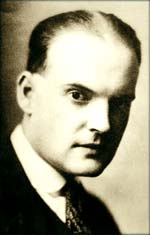 While doing research to improve my ability to write about literature (because let’s face the facts: professional or not, humility is good for the evolving writer), I stumbled across an impressive and really informative critic — some guy named Edmund Wilson. Wilson covered a broad range of books and actually thought things out to prevent himself from stating foolish declarations in his reviews. He didn’t feel the need to dismiss anyone else who wrote about books. He actually analyzed their arguments and responded in a fair and amicable manner. He had such a love of literature that he offered his editorial services for Fitzgerald’s two posthumous volumes. He wasn’t paid a dime for this, which I suppose makes him, in part, an amateur.
While doing research to improve my ability to write about literature (because let’s face the facts: professional or not, humility is good for the evolving writer), I stumbled across an impressive and really informative critic — some guy named Edmund Wilson. Wilson covered a broad range of books and actually thought things out to prevent himself from stating foolish declarations in his reviews. He didn’t feel the need to dismiss anyone else who wrote about books. He actually analyzed their arguments and responded in a fair and amicable manner. He had such a love of literature that he offered his editorial services for Fitzgerald’s two posthumous volumes. He wasn’t paid a dime for this, which I suppose makes him, in part, an amateur.
Wilson was so fearless in his criticism that he even lost his friendship with Nabokov because he dared to tell the truth. He wasn’t afraid to state what was on his mind and never resorted to passive-aggressive potshots directed at other critics when writing about the state of literature. Wilson read widely and in multiple languages. When reviewing a book, he would read the author’s entire oeuvre, not just the book in question. He thought of himself as a journalist more than as a critic, and, as a result of this humility and broad-mindedness, nabbed bylines in The New Republic, Vanity Fair and The New York Review of Books.
I think about folks like Wilson when contemplating why so many print critics are intimidated by bloggers, when all we’re really asking them to do is raise the bar and become aware of the books that we seem to be reading and they seem to be ignoring. But it’s worth going back to Wilson. He’s an intellectual gold mine.
[UPDATE: A note to John Freeman, since he inspired this post and doesn’t have the cojones to address me, one of the apparent podcasting hacks, in a direct and honest manner. (And really I’m happy to listen to anything Freeman has to say, no matter how vitriolic. Unlike Freeman, I not only value my critics, but learn from them.) If you’re going to take the piss out of me, at least have the decency to spell Don Swaim’s name correctly. I may be a mere blogger, but at least I know how to spell. This is also extremely disrespectful to Swaim’s great legacy. I know this, because I’ve listened to many of the man’s interviews myself to make the Segundo shows better. (Oh, and since we’re dicking around with who interviewed notable people first, not that such a childish claim over who’s been around longer should matter, I interviewed Errol Morris in 1999, among many others in the late 90s. Do I get a prize? Should I provide my own Critical Outtakes?]
Comedy of Embarassment
David Bowie’s hilarious appearance on Extras. This may even outdo Patrick Stewart’s appearance, and it’s a catchy tune to boot.


